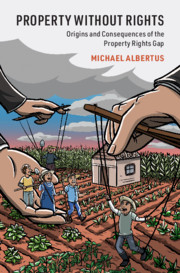Book contents
- Property without Rights
- Cambridge Studies in Comparative Politics
- Property without Rights
- Copyright page
- Contents
- Figures
- Tables
- Acknowledgments
- 1 Introduction
- 2 Conceptualizing and Measuring the Property Rights Gap
- 3 The Political Origins of the Property Rights Gap
- 4 Evidence on the Rise and Fall of Property Rights Gaps in Latin America
- 5 Consequences of the Property Rights Gap
- 6 Opening and Closing a Property Rights Gap in Peru
- 7 The Long-Term Consequences of Peru’s Property Rights Gap
- 8 Property Rights Gaps around the World
- 9 Conclusion
- Book part
- References
- Index
- Other Books in the Series (continued from page iii)
3 - The Political Origins of the Property Rights Gap
Published online by Cambridge University Press: 22 December 2020
- Property without Rights
- Cambridge Studies in Comparative Politics
- Property without Rights
- Copyright page
- Contents
- Figures
- Tables
- Acknowledgments
- 1 Introduction
- 2 Conceptualizing and Measuring the Property Rights Gap
- 3 The Political Origins of the Property Rights Gap
- 4 Evidence on the Rise and Fall of Property Rights Gaps in Latin America
- 5 Consequences of the Property Rights Gap
- 6 Opening and Closing a Property Rights Gap in Peru
- 7 The Long-Term Consequences of Peru’s Property Rights Gap
- 8 Property Rights Gaps around the World
- 9 Conclusion
- Book part
- References
- Index
- Other Books in the Series (continued from page iii)
Summary
This chapter begins with existing explanations for rights informality: weak state capacity, left-wing ideology, and competing state goals. It then develops a theory for understanding why governments that distribute land often withhold property rights, presiding over widespread rural property informality for long periods, and why other governments grant more secure property rights over land. Authoritarian regimes tend to redistribute land from large landowners to peasants but withhold property rights. Democracies often grant property rights to beneficiaries of previous land reforms but do not redistribute additional property. This difference is driven by how political regimes empower or disempower landed elites and peasants, differences in institutional powers, and constraints that political elites face, and the incentives of incumbency and political competition. Democracies are better at channeling popular demands into policy. But policies can also be blocked by the powerful in a legislature. Finally, foreign pressure during economic crisis can force a country to turn to international financial institutions for help. Privatization and greater security of property rights can be a condition for support.
Keywords
- Type
- Chapter
- Information
- Property without RightsOrigins and Consequences of the Property Rights Gap, pp. 71 - 123Publisher: Cambridge University PressPrint publication year: 2021



